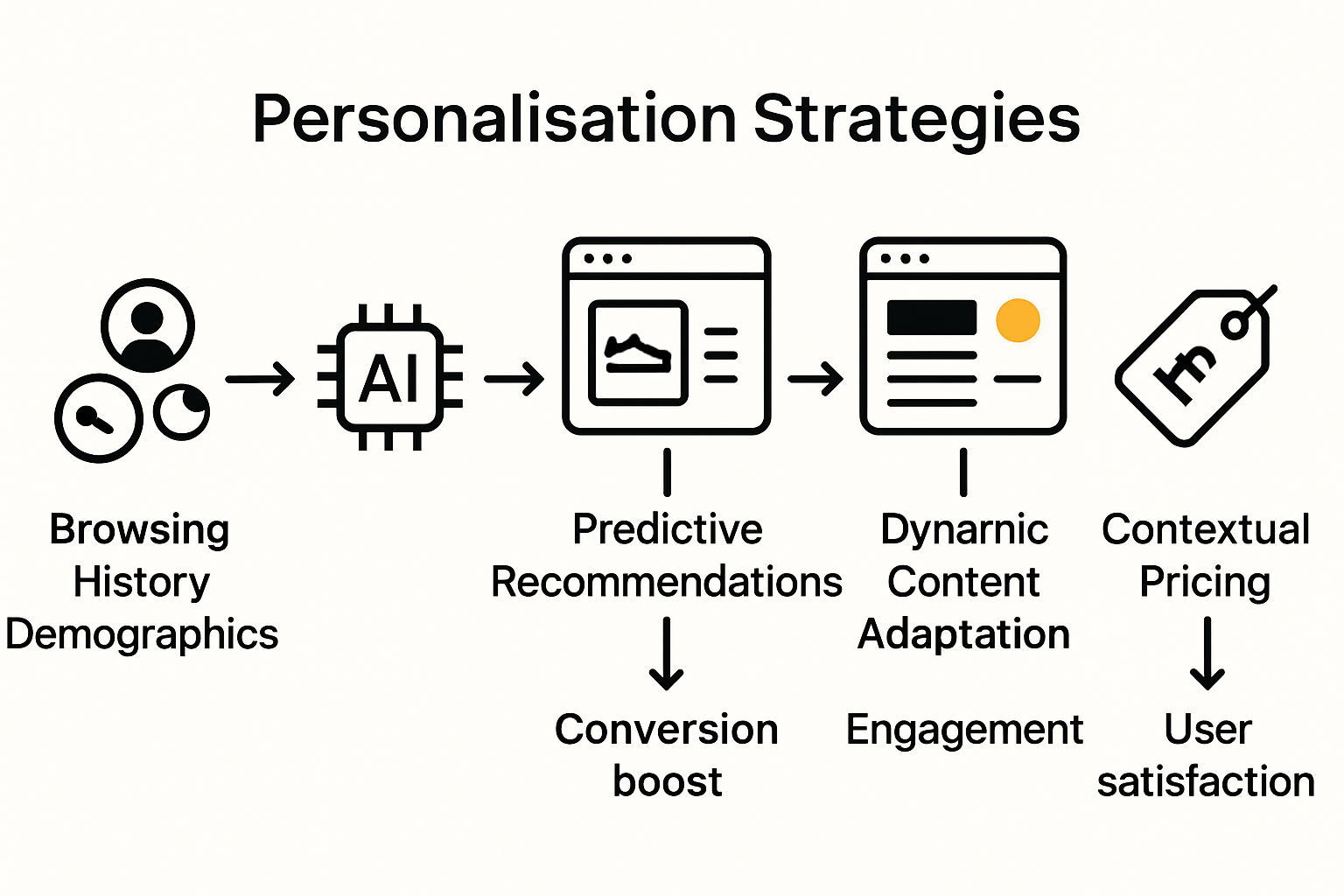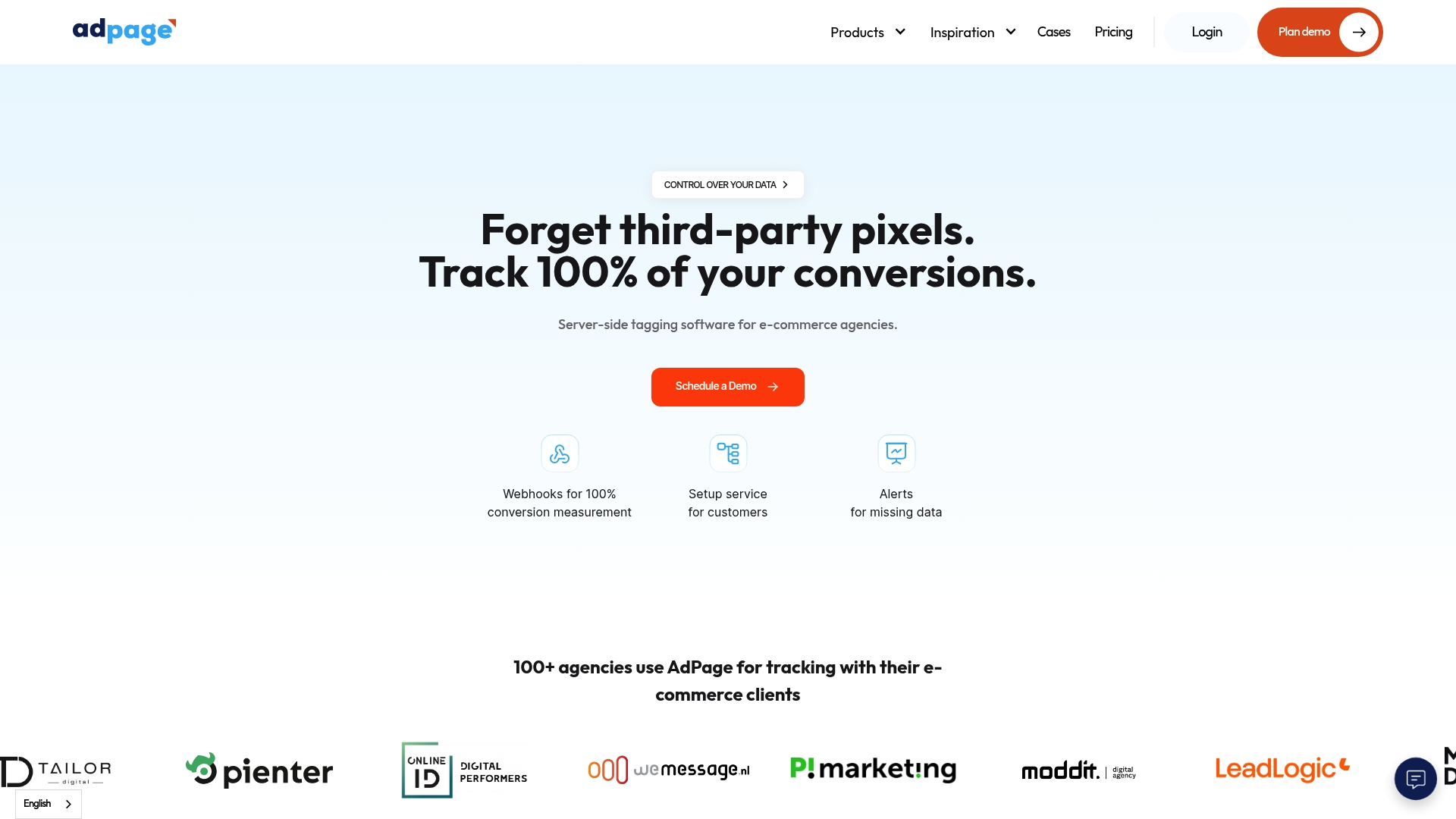Personalization is now shaping everything about shopping online and shoppers no longer settle for guesswork. In fact, optimizing product recommendations can elevator purchase-through rates by up to 7.34 percent. Most think the challenge is just about collecting more data. It is not. The real shift is about balancing trust, privacy and user delight in a way that actually keeps people coming back for more.
Table of Contents
- What Personalization in E-commerce Means Today
- Proven Personalization Strategies for Higher Sales
- Analytics and Tools to Measure E-commerce Personalization
- Future Trends in E-commerce Personalization for 2025.
Quick Summary
| Takeaway | Explanation |
|---|---|
| Personalization is essential for e-commerce | Consumers now expect tailored experiences, making personalization crucial for engagement and sales. |
| Leverage data-driven strategies for success | Use advanced analytics to create personalized shopping experiences based on customer data and behavior. |
| Maintain a balance between personalization and privacy | Ensure transparency and security in data usage to build trust while delivering tailored experiences. |
| Implement intelligent product recommendation systems | Optimizing product recommendations can significantly increase conversion rates and enhance user satisfaction. |
| Adopt immersive personalization technologies | Embrace AR and VR to create engaging, interactive shopping experiences that resonate with consumers' preferences. |
What Personalization in E-commerce Means Today
Personalization in e-commerce has transformed from a simple marketing trend to a sophisticated strategy that fundamentally reshapes how online businesses interact with customers. At its core, personalization represents a data-driven approach to creating tailored shopping experiences that speak directly to individual consumer preferences, behaviors, and needs.
The Evolution of Customer Expectations
Customer expectations have dramatically shifted in recent years. Modern consumers no longer view personalized experiences as a luxury but as a standard requirement. Research from the European Economic Letters reveals that personalization significantly increases user engagement metrics, including time spent on sites and conversion rates. Shoppers now anticipate recommendations that feel curated specifically for them, not generic suggestions that could apply to anyone.
This expectation extends beyond product recommendations. Personalization now encompasses entire user journeys - from customised landing pages to individually tailored email communications and dynamic pricing strategies. The goal is creating an experience that feels intuitive and effortless for each unique visitor.
Data-Driven Personalization Strategies.
Successful personalization relies on sophisticated data collection and analysis techniques. According to the Future Business Journal, AI-driven recommendation systems play a crucial role in enhancing customer trust and satisfaction. These systems analyze multiple data points including browsing history, previous purchases, demographic information, and real-time interactions to generate highly targeted experiences.
Key personalization strategies now include:

- Predictive Recommendations: Using machine learning algorithms to suggest products before customers explicitly search for them
- Dynamic Content Adaptation: Automatically adjusting website elements based on individual user profiles
- Contextual Pricing: Offering personalized pricing and promotions aligned with specific customer segments
Privacy and Personalization Balance
While personalization offers immense potential, businesses must navigate complex privacy considerations. Consumers want tailored experiences but remain concerned about data usage. Transparent data practices, clear consent mechanisms, and robust security protocols are no longer optional but essential.
The following table summarizes several key privacy-focused principles and solutions for balancing personalization and customer trust in e-commerce, as described earlier in the article:
| Privacy Principle | Description | Importance |
|---|---|---|
| Transparent Data Practices | Clearly informing users about how data will be used | Builds trust |
| Consent Mechanisms | Allowing opting-in for personalization features | Ensures user control |
| Robust Security Protocols | Implementing data protection measures | Safeguards customer information |
| Opt-Out Capabilities | Letting users easily disable personalization if desired | Respects individual preferences |
Learn more about effective targeting strategies that respect user privacy while delivering exceptional personalized experiences. The most successful e-commerce platforms will be those that strike a delicate balance between data-driven insights and consumer trust.
As we move deeper into 2025, personalization will continue evolving from a competitive advantage to an absolute necessity for online businesses seeking meaningful customer connections.
Proven Personalization Strategies for Higher Sales
Successful e-commerce personalization requires strategic implementation of data-driven techniques that transform customer interactions from generic experiences to targeted engagement. The right approach can significantly amplify sales performance and customer loyalty.
To help readers compare the different personalization strategies discussed, the following table summarizes the key e-commerce personalization methods and their main features and benefits:
| Strategy | Main Features | Benefits |
|---|---|---|
| Product Recommendation Systems | Collaborative, content-based, and hybrid algorithms | Boosts conversions and user satisfaction |
| Personalized Email Marketing | Dynamic suggestions, context-relevant content, time-sensitive offers | Increases click-through and engagement rates |
| Contextual User Experience Adaptation | Customized landing pages, navigation, real-time content adjustments | Enhances relevance and builds loyalty |
| Dynamic Pricing | Individualized promotions and pricing for segments | Improves competitiveness and conversion probability |
Intelligent Product Recommendation Systems
Product recommendation engines represent the cornerstone of effective personalization strategies. Research from a comprehensive e-commerce study revealed that optimizing recommendation modules on product pages can increase purchase-through rates by up to 7.34%. These systems leverage machine learning algorithms to analyze user behavior, purchase history, and real-time interactions.
Key recommendation techniques include:
- Collaborative Filtering: Suggesting products based on similar customer preferences
- Content-Based Filtering: Recommending items matching a user's previous selections
- Hybrid Approaches: Combining multiple recommendation methodologies for more accurate suggestions
Personalized Email Marketing Campaigns
Email remains a powerful channel for delivering personalized experiences. Research on e-commerce email strategies demonstrated that targeted product recommendations via email can generate a remarkable 9% increase in click-through rates. Successful campaigns go beyond simple name personalization, incorporating:
- Dynamically generated product suggestions
- Contextually relevant content based on browsing history
- Time-sensitive offers aligned with individual customer preferences
Contextual User Experience Adaptation
True personalization extends beyond product recommendations. Learn more about boosting online sales through adaptive user experiences. Modern platforms now dynamically adjust website elements, including:
- Customised landing pages
- Personalized navigation paths
- Contextual pricing and promotional offers
- Real-time content modifications based on user segments
The most effective personalization strategies recognize that each customer interaction is unique. By leveraging advanced data analytics and machine learning, e-commerce platforms can create experiences that feel intuitive, relevant, and deeply engaging.
As technology continues to evolve, businesses that master nuanced, ethical personalization will distinguish themselves in an increasingly competitive digital marketplace.
Analytics and Tools to Measure E-commerce Personalization
Measuring personalization effectiveness requires sophisticated analytics tools that go beyond traditional metrics, providing deep insights into user behavior, engagement, and conversion dynamics. Understanding these sophisticated measurement techniques enables businesses to refine their personalization strategies continuously.
Advanced User Interaction Tracking
Research utilizing machine learning algorithms demonstrates the potential of advanced analytics in understanding user preferences. These systems employ complex association rule mining techniques to decode intricate user interaction patterns, revealing nuanced insights that traditional analytics might miss.
Key metrics for comprehensive personalization analytics include:

- Engagement Depth: Measuring time spent, interaction frequency, and content consumption patterns
- Conversion Impact: Tracking how personalized experiences influence purchasing decisions
- Recommendation Effectiveness: Analyzing click-through and conversion rates for personalized suggestions
Machine Learning-Powered Recommendation Analysis
Cutting-edge recommendation systems now leverage sophisticated machine learning models to provide granular performance insights. A groundbreaking study introduced a personalized recommendation approach using BERT models and nearest neighbor algorithms, showcasing how advanced techniques can dramatically enhance user experience analysis.
Important analytical considerations include:
- Real-time performance monitoring
- Predictive user behavior modeling
- Granular segmentation and cohort analysis
Comprehensive Personalization Performance Frameworks.
Learn how to leverage advanced analytics to transform raw data into actionable insights. The most effective measurement frameworks integrate multiple data sources, providing a holistic view of personalization performance.
A robust analytics approach should encompass:
- Cross-platform tracking
- Consent-compliant data collection
- Multi-dimensional performance indicators
Research on homepage carousel ranking highlights the importance of scalable, real-time analytics systems. These systems capture user interaction likelihood, providing unprecedented insights into user preferences and engagement patterns.
Successful e-commerce platforms recognize that measurement is not just about collecting data, but about transforming that data into meaningful, actionable strategies that continuously improve user experiences. As personalization technologies evolve, so too must our approaches to understanding and optimizing their impact.
Future Trends in E-commerce Personalization for 2025.
The landscape of e-commerce personalization is rapidly evolving, driven by emerging technologies and shifting consumer expectations. As we move deeper into 2025, businesses must anticipate and adapt to groundbreaking trends that will redefine customer interactions and digital shopping experiences.
Artificial Intelligence and Predictive Personalization
Artificial Intelligence is set to revolutionize personalization strategies beyond current capabilities. Advanced machine learning models will enable hyper-precise predictive personalization, anticipating customer needs before they even articulate them. Research on emerging AI technologies suggests that intelligent systems will combine complex data points to create unprecedented levels of individualized experiences.
Key AI-driven personalization developments include:
- Emotional Intelligence Algorithms: Detecting and responding to user emotional states
- Contextual Recommendation Engines: Understanding nuanced user intent beyond simple browsing history
- Predictive Purchase Modeling: Forecasting potential customer purchases with remarkable accuracy
Immersive and Interactive Personalization Experiences
The future of e-commerce personalization extends beyond digital interfaces into immersive experiences. Augmented reality (AR) and virtual reality (VR) technologies will transform how customers interact with products. Learn more about future e-commerce tracking innovations that are reshaping customer engagement strategies.
Emerging interactive personalization approaches will include:
- Virtual try-on experiences with precise body measurements
- Personalized 3D product configurators
- Real-time virtual shopping assistants adapting to individual preferences
Ethical Personalization and Privacy-First Approaches.
As personalization technologies advance, ethical considerations become paramount. Consumers are increasingly demanding transparency, control, and respect for their personal data. Future personalization strategies must balance sophisticated targeting with robust privacy protections.
Critical ethical personalization principles will involve:
- Explicit user consent mechanisms
- Granular data control options
- Transparent algorithmic decision-making processes
- Opt-out capabilities with minimal friction
The most successful e-commerce platforms in 2025 will be those that view personalization not as a technological capability, but as a nuanced dialogue between businesses and consumers. By prioritizing individual agency, technological innovation, and genuine value creation, companies can transform personalization from a marketing strategy into a meaningful customer relationship.
As digital ecosystems become more complex, the true differentiator will be not just how much data a business can collect, but how intelligently and ethically they can use that data to enhance genuine human experiences.
Frequently Asked Questions
What is personalization in e-commerce?
Personalization in e-commerce refers to tailoring shopping experiences to individual customers based on their preferences, behaviors, and needs through data-driven strategies.
How can businesses balance personalization with customer privacy?
Businesses can balance personalization and privacy by adopting transparent data practices, obtaining user consent, implementing robust security measures, and providing opt-out capabilities to respect customer preferences.
What are some effective personalization strategies to boost sales?
Effective personalization strategies include intelligent product recommendation systems, personalized email marketing campaigns, and contextual user experience adaptations that enhance engagement and conversion rates.
How does artificial intelligence enhance e-commerce personalization?
Artificial intelligence enhances e-commerce personalization through predictive algorithms that anticipate customer needs, contextual recommendation engines that consider user intent, and emotional intelligence capabilities that adapt to user emotional states.
Ready to Build Trust and Drive More Sales with Personalized Analytics?
As discussed in the article, brands face the real challenge of balancing advanced personalization with customer privacy. Many marketing teams struggle to collect accurate data because of browser restrictions, gaps in tracking, and complicated consent requirements. This often means lost conversions and less relevant recommendations for your customers. Modern e-commerce demands precision, compliance and a seamless user experience to gain an edge in 2025.

Unlock the power of data-driven personalization while addressing privacy concerns. With AdPage, you can:
- Capture 100% of conversions using robust server-side tagging and tracking tools.
- Strengthen trust by integrating GDPR-compliant consent management directly into your customer journeys.
- Seamlessly connect with your existing e-commerce platform for simpler onboarding and ongoing optimization.
Take control of your analytics and start delivering tailored, high-converting experiences today. Discover how AdPage can solve your personalization and tracking obstacles by visiting our main site now. Your path to higher conversions and customer trust starts here.



.png)
